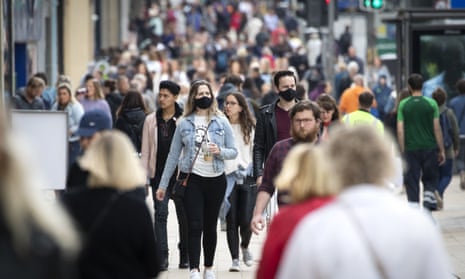Consumer confidence in the UK has fallen to the lowest level since records began in 1974 amid growing concern over the cost of living crisis.
Stoking fears that Britain is heading for a recession caused by the squeeze on family budgets, the latest monthly snapshot showed consumers are now gloomier about their prospects than they were during the 2008 financial crisis.
Almost all confidence measures tracked by the polling firm GfK fell in May, continuing a steep decline from April when households were hit by record increases in energy bills after the rise in the Ofgem price cap.
The headline UK consumer confidence index, a measure of how people view their personal finances and the wider economic outlook, dropped by two percentage points to -40 in May, surpassing the previous record low of -39 set in July 2008 when the global banking system was imploding.
Joe Staton, client strategy director at GfK, said: “This means consumer confidence is now weaker than in the darkest days of the global banking crisis, the impact of Brexit on the economy, or the Covid shutdown.”
Economists warned in April when the index dropped to -38 that such a low reading was consistent with Britain’s economy falling into recession, because it had closely tracked UK GDP over the past five decades.
“That correlation has been robust to many economic regimes and shocks, from 1970s stagflation to the great moderation and the financial crisis,” said Robert Wood, UK economist at the Bank of America. “Consumer confidence matters because it gives an early, reliable, signal.”
UK inflation rose to 9% in April, the highest level since the early 1980s, as hard-pressed families come under mounting pressure from soaring energy bills, record petrol prices and the rising cost of the weekly shop.
It comes as the impact of Russia’s war in Ukraine ripples through global oil and gas markets, exacerbating a post-lockdown surge in prices.
Economists expect the historic hit to living standards to lead to consumers tightening their belts as soaring prices for essentials such as food, fuel and energy force them to cut back on other purchases. Official figures show retail sales fell by more than expected in March, while industry data suggests the spending slump continued in April as households grappled with the record 54% rise in gas and electricity bills.
The Bank of England warned earlier this month that Britain’s economy runs a heightened risk of recession as inflation heads towards 10%.
GfK said its index measure based on asking consumers about their plans for big-ticket purchases had decreased for each of the past six months. Consumer pessimism was most evident in people’s views on the general economy, with an index score of -63 for the past year and -56 for the coming year.
Figures from the Office for National Statistics published on Thursday showed a six percentage point weekly fall in UK credit and debit card spending last week, as well as a 10 point drop in the number of seated diners in restaurants. However, the figures come after the early May bank holiday weekend, when sales rose sharply.
The ONS said the rising cost of materials and energy were the top concern for UK companies. As many as 26% of businesses said rising costs were their main concern this month, up from 24% in April 2022, followed by 20% who said soaring energy prices were the biggest worry.
Joe Staton, from GfK, added: “Even the Bank of England is pessimistic, with governor Andrew Bailey this week offering no hope of tackling inflation. The outlook for consumer confidence is gloomy, and nothing on the economic horizon shows a reason for optimism any time soon.”
